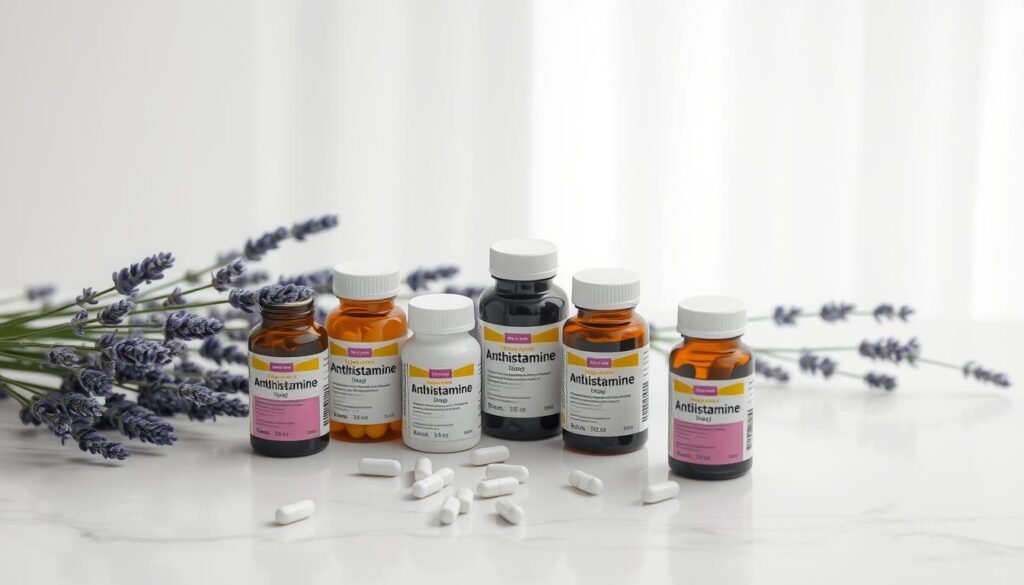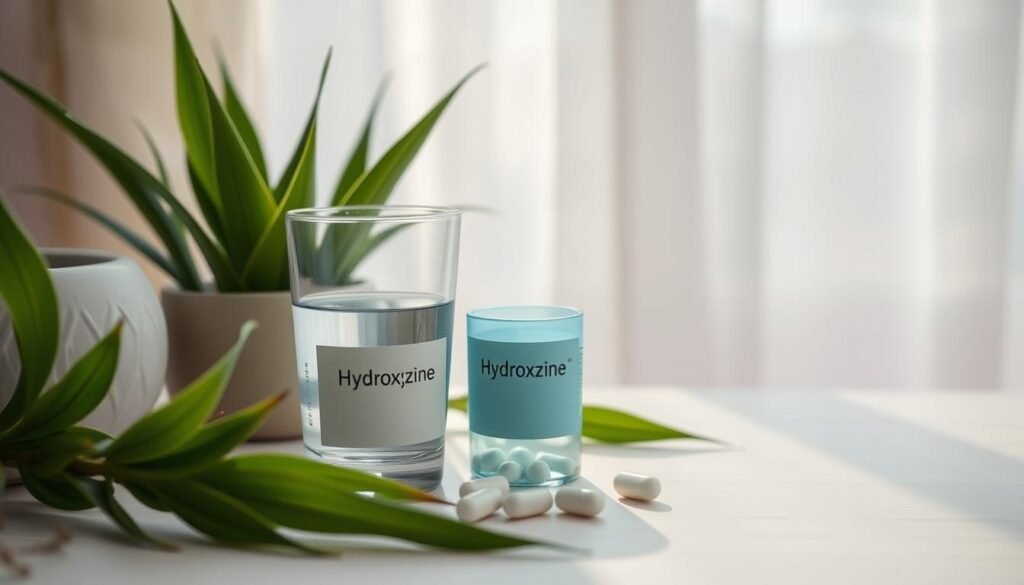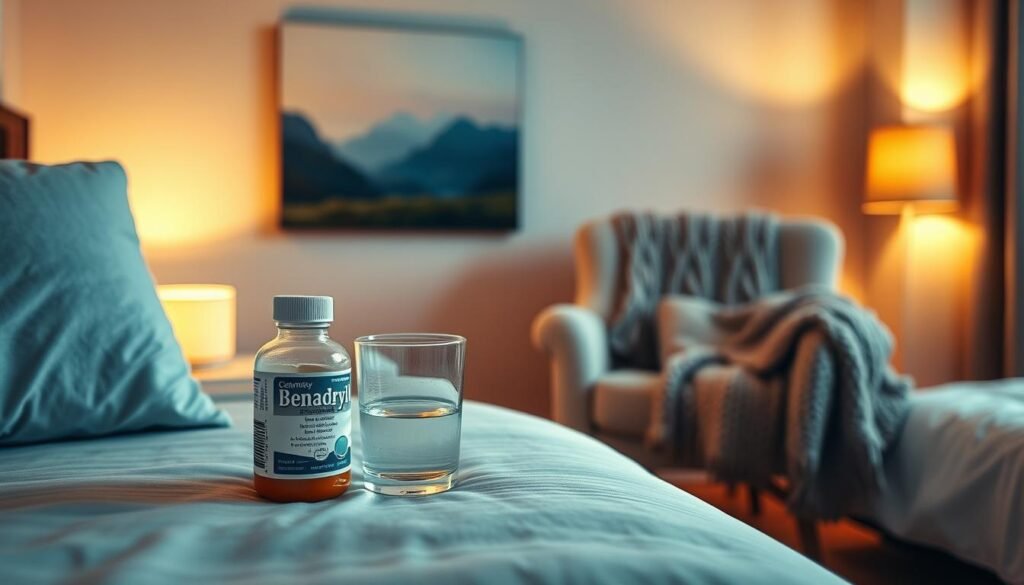Could medications for allergies be the key to managing anxiety? Around 19.1% of U.S. adults suffer from anxiety disorders. They are searching for effective solutions. Some are looking into antihistamines, like hydroxyzine and Benadryl, for relief. These calming medications might offer a temporary peace. But, how do they stack up against traditional anxiety treatments in safety and effectiveness?
This article investigates antihistamines as a potential anxiety solution. We’ll look at their effectiveness in easing anxiety and what to watch out for. For more information, check out this detailed guide on antihistamines for anxiety.
Key Takeaways
- An estimated 19.1% of adults in the U.S. struggle with anxiety disorders.
- Antihistamines are often prescribed off-label for short-term anxiety treatment.
- Hydroxyzine is FDA-approved for anxiety, offering a lower risk of dependency compared to benzodiazepines.
- Side effects of antihistamines may include dizziness, dry mouth, and fatigue.
- A multi-faceted approach, including therapy and lifestyle changes, is advisable for comprehensive anxiety management.
Understanding Anxiety Disorders
Anxiety disorders are the most common mental health issues in the U.S., affecting many people. It’s vital to know how common anxiety is to understand its impact. About 32% of American adults will face an anxiety disorder at some point, showing the need for better care options.
The Prevalence of Anxiety in the U.S.
Anxiety disorders cause a lot of missed work and school days, costing more than other mental illnesses. This is an important issue for bosses and teachers to know about. Since 2005, anxiety disorders have increased by 15% worldwide, affecting 264 million people. However, 60–85% of people find some relief with current treatments, showing we need better options.
Different Types of Anxiety Disorders
Social Anxiety Disorder and Specific Phobia are among the most seen anxiety types. Spotting symptoms early, like feeling restless or easily annoyed, is key to managing them. If worried about anxiety, taking an online test can help figure out what’s going on.
It’s crucial to keep learning about anxiety disorders and their effects. Generalized anxiety disorder, for example, often comes back or doesn’t go away fully, especially with depression. Looking at treatments that are specific to each anxiety type could make recovery and well-being better.
| Anxiety Disorder | Description | Common Symptoms |
|---|---|---|
| Generalized Anxiety Disorder (GAD) | Chronic and exaggerated worry about everyday life events. | Restlessness, fatigue, irritability, difficulty concentrating. |
| Panic Disorder | Repeated panic attacks involving sudden fear and physical distress. | Heart palpitations, shortness of breath, confusion, dizziness. |
| Social Anxiety Disorder (SAD) | Fear of social situations and being judged by others. | Intense anxiety in social settings, self-consciousness. |
| Specific Phobia | Extreme fear of a specific object or situation. | Irrational fear, avoidance behavior, panic response. |
What Are Antihistamines?
Antihistamines are drugs mainly for fighting allergies. They stop histamine effects in the body. Histamine causes symptoms like sneezing and itching.
By blocking histamine, these drugs ease those symptoms.
Mechanism of Action
Antihistamines work by binding to histamine receptors. Histamine affects mood and emotions, relating to anxiety disorders. Drugs like diphenhydramine aid in controlling neurotransmitters.
This control can lead to reduced anxiety. Some antihistamines also have sedative effects.
Common Types of Antihistamines
There are two kinds of antihistamines: first-generation and second-generation. First-generation, like diphenhydramine in Benadryl, can cause drowsiness. They’re used sometimes for anxiety.
Second-generation antihistamines, such as Loratadine and Cetirizine, are less sedating. They’re better for allergies with fewer side effects. Hydroxyzine also helps with anxiety and allergies.
Can Antihistamine for Anxiety Help Calm Your Mind?
Anxiety disorders affect many people worldwide. This leads them to look for treatments that work. Some consider using antihistamines, not for allergies, but for anxiety. It’s important to know if these meds can help right away even when thinking about long-term treatment.
Off-Label Use of Antihistamines
Older antihistamines like diphenhydramine make you sleepy. This might help with anxiety by calming the brain. Studies show that some antihistamines can help with anxiety. Hydroxyzine is one such medicine, known for its efficiency without addiction risks.
Short-Term Relief vs. Long-Term Solutions
Many look for a quick fix for anxiety with medicines like hydroxyzine. But for long-lasting relief, more is needed. A mix of therapy and lifestyle changes can really make a difference. Hydroxyzine works fast, but it’s not a complete solution on its own.
Here’s how short-term and long-term treatments differ:
| Aspect | Short-Term Relief | Long-Term Solutions |
|---|---|---|
| Medications | Antihistamines (e.g., hydroxyzine) | SSRIs, SNRIs, Therapy |
| Onset of Action | Hours | Weeks |
| Risk of Dependency | Low (hydroxyzine) | Moderate to High (benzodiazepines) |
| Typical Use | As-needed basis | Daily treatment |
| Emotional Regulation | Immediate effects | Sustainable coping mechanisms |

Exploring Hydroxyzine for Anxiety
Hydroxyzine, also known as Vistaril, is an FDA-approved anxiety treatment. It’s great for people with anxiety disorders, including generalized anxiety disorder and panic attacks. The sedative effects help reduce tension and discomfort.
FDA Approval and Uses
Hydroxyzine is celebrated for easing anxiety symptoms. It’s also used for sedation before general anesthesia. Given that over 30 percent of US adults may experience anxiety at some point, hydroxyzine offers critical relief.
Dosage Information and Benefits
Dosing hydroxyzine correctly is key. Adults usually take 50 to 100 milligrams four times daily for anxiety. For kids six and up, the dose can be 50 to 100 mg spread over the day. Effects start within 15 to 30 minutes, peaking in about two hours.
Hydroxyzine stands out because it’s non-addictive. It won’t cause dependence like some anxiety drugs. Plus, it can help calm patients before surgeries.

Most people handle hydroxyzine well, but drowsiness can happen, especially with high doses. Though rare, serious reactions like seizures and severe skin issues can occur. Always talk to a healthcare provider before starting hydroxyzine, especially if taking other meds or if you have certain health conditions.
The Role of Benadryl in Managing Anxiety Symptoms
Benadryl is often used for allergy relief. It has a calming effect that might help with anxiety. Knowing how diphenhydramine effects the brain is useful for understanding anxiety management.
How Benadryl Works for Anxiety
Benadryl’s calming effect comes from blocking brain’s histamine. This can make you sleepy, helping with anxiety. It starts working in 15 to 30 minutes, and adults take 25 to 50 milligrams. But, Benadryl isn’t officially approved for treating anxiety. Hydroxyzine is approved and might be safer with fewer side effects.
Potential Risks and Side Effects
Benadryl might help with anxiety short-term, but it has risks. You might feel sleepy, dizzy, or confused. Taking too much can lead to serious problems like seizures. It can also be dangerous with alcohol or some medicines. Always talk to a doctor before using Benadryl for anxiety.

| Aspect | Details |
|---|---|
| Type | Antihistamine (Diphenhydramine) |
| Onset Time | 15-30 minutes |
| Dosage for Anxiety | 25-50 mg |
| FDA Approval | Not approved for anxiety |
| Common Side Effects | Drowsiness, dizziness, confusion |
| Risks of Overdose | Agitation, hallucinations, seizures |
| Interaction with Alcohol | Yes, increases risks |
Comparing Antihistamines to Traditional Anxiety Medications
Understanding how antihistamines differ from traditional anxiety meds, like benzodiazepines, is key for managing anxiety. They both ease anxiety, but work differently and have different side effects.
Effectiveness of Antihistamines vs. Benzodiazepines
Antihistamines, such as hydroxyzine, mildly calm the nerves. They’re great for short-term use, offering a gentler option for relief. In contrast, benzodiazepines, like Xanax and Valium, work quickly to reduce anxiety. They can ease symptoms in as fast as 30 minutes.
Benzodiazepines, however, have a downside. They can lead to dependency, needing more over time to get the same effect. The American Academy of Family Physicians warns their effect fades after 4 to 6 months of regular use.
Side Effects and Dependency Issues
Both drug types have side effects to think about. Benzodiazepines can cause drowsiness, dizziness, and confusion, affecting daily life. They may also lead to memory issues and emotional numbness, besides the high risk of addiction.
Antihistamines, on the other hand, are less likely to cause dependency. Hydroxyzine, in particular, is effective for anxiety with a much lower addiction risk. It’s a good choice for those concerned about the dependency risks of traditional meds.
| Medication Type | Effectiveness | Common Side Effects | Risk of Dependency |
|---|---|---|---|
| Benzodiazepines | Rapid relief within 30-60 minutes | Drowsiness, dizziness, memory problems | High |
| Antihistamines | Short-term relief, milder effects | Fatigue, dry mouth, upset stomach | Low |
Natural Antihistamines and Alternative Treatments
Exploring natural antihistamines can help people find different ways to treat anxiety. It avoids the need for standard medication. Herbs and changes in lifestyle are key for a whole approach to staying mentally healthy.
Herbal Remedies for Anxiety Relief
Several herbal options are great for easing anxiety symptoms. Let’s look at some important ones:
- Vitamin C: Studies show vitamin C can lessen symptoms like itching and sneezing. It’s good for anxiety linked with allergies.
- Probiotics: These tiny organisms might lower allergy symptoms. That can help with emotional balance and less anxiety.
- Stinging Nettle: Known for reducing allergy symptoms. Less symptoms mean less anxiety for those with allergies.
- Quercetin: This antioxidant might cut down allergy symptoms and acts a bit like an antihistamine.
- Bromelain: It fights sinus problems and could help with respiratory health. This can decrease anxiety about breathing issues.
- Butterbur: Research is showing it’s a safe, effective way to treat seasonal allergies. This can ease anxiety linked to allergies.
Lifestyle Changes and Their Impact on Anxiety
Making changes in your lifestyle can deeply influence anxiety levels. Some key areas to focus on include:
- Diet: Eating well, with lots of vitamins, minerals, and antioxidants supports the immune system. Foods with vitamin C and probiotics can lessen anxiety.
- Exercise: Being active releases endorphins and lifts your mood. It might also help if you have allergies.
- Stress Management Techniques: Yoga, meditation, and deep breathing reduce stress. They make a big difference in your overall emotional well-being.
Safety Considerations for Antihistamine Use
Antihistamines are getting more attention for their role in treating anxiety. It’s vital to know how safe they are, especially when mixed with other meds. Knowing about drug interactions helps avoid harmful side effects. This makes sure treatment with antihistamines is both effective and safe.
Possible Drug Interactions
Antihistamines might not mix well with other drugs. Mixing them with alcohol or narcotics can make you very sleepy or even risk an overdose. Some antidepressants and antiepileptics also may not go well with antihistamines. It’s crucial to understand these interactions to keep safe.
Consulting a Healthcare Provider
Before starting antihistamines, talking to a doctor is key. They check if your health, like being pregnant or having certain conditions, affects using antihistamines. They give advice focused on safety, helping those with anxiety make informed choices. For more info on antihistamines, you can visit the Cleveland Clinic.
Conclusion
Anxiety is common worldwide. It includes types like generalized anxiety disorder and social anxiety disorder. Many look for good treatment options. Antihistamines are being looked into for help. They block certain brain receptors which may help calm people, especially when using certain types like diphenhydramine.
Yet, using antihistamines for long-term help is not fully proven. They can help short-term, but there are risks. These risks include dependency and bad side effects. It’s very important to talk to a healthcare provider. They can help create a safe and personal plan, which may include therapy and lifestyle changes alongside medications.
Dealing with anxiety takes a well-rounded approach. Knowing how antihistamines may help is one piece of the puzzle. Making smart choices about mental health matters. Getting professional advice and a mix of therapies is key to feeling better emotionally.